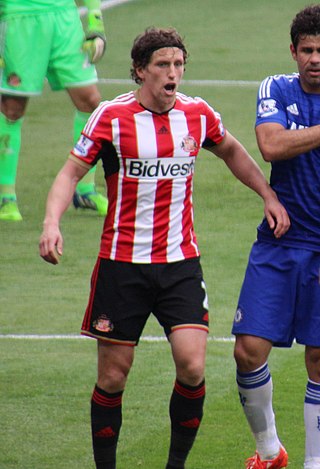Related Research Articles
In professional association football, a free transfer, also known as a Bosman transfer, involves a professional association football club releasing a player when the player's contract has expired or made available just before the end of the contract. The player can then go on to sign for any club offering a contract to them.
Pascal Chimbonda is a French football coach and professional player who most recently was the player-manager of English non-league club Skelmersdale United.

Robert James Blake is an English former professional footballer and current men’s first team manager at Bognor Regis Town. He began his career as a striker but was increasingly used as midfielder in the latter part of his career.
Sean Davis is an English former professional footballer who played as a midfielder.
A transfer window is the period during the year in which a football club can add players to their squad who were previously under contract with another club. Such a transfer is completed by registering the player into the new club through FIFA. "Transfer window" is the unofficial term commonly used by the media for the concept of "registration period" as described in the FIFA Regulations on the Status and Transfer of Players. According to the rules, each national football association decides on the time of the 'window' but it may not exceed 12 weeks. The second registration period occurs during the season and may not exceed four weeks.

Daniel Michel Cousin is a Gabonese former professional footballer who played as a striker.
In professional football, a transfer is the action taken whenever a player under contract moves between clubs. It refers to the transferring of a player's registration from one association football club to another. In general, the players can only be transferred during a transfer window and according to the rules set by a governing body. A negotiated transfer fee is agreed financial compensation paid from an interested club to the club that possesses the player's exclusive contracted playing rights. When a player moves from one club to another, their old contract is terminated whilst the player and their new destination club will both negotiate on new contract terms. As such, the transfer fee functions as financial compensation for the early mutually agreed termination of the contract of a professional football player. Transfer fees are contingent on the player’s current football abilities, future potential, duration of the existing contract, amount of future salary owed and the willingness of clubs to agree on an economic equilibrium through supply and demand.

Billy Jones is an English former professional footballer who played as a right-back.

Nicholas Alexander Law is an English professional footballer who is currently the assistant coach of the Tampa Bay Rowdies in the USL Championship. He is the son of football manager and former player Nicky Law Sr.
Leeds United Football Club Limited, founded 4 May 2007, is a limited company, the directors of which are Ken Bates, Shaun Harvey and Mark Taylor. The company purchased Leeds United A.F.C. via a creditors vote after the club entered administration, but this ownership was challenged by HM Revenue & Customs and the club was subsequently put up for sale by the administrators KPMG.
Aberdeen competed in the Scottish Premier League, Scottish Cup, Scottish League Cup and UEFA Cup in the 2007–08 season. It was the club's first season in European competition since 2002–03.
Manchester City Football Club dates back to 1894, when Ardwick A.F.C. dissolved and was reformed as Manchester City Football Club Ltd. Over recent years, the state of ownership and finances of Manchester City Football Club has been tumultuous, featuring various owners of contrasting fortunes, in line with the club's inconsistent trend on the pitch. The club is currently owned by the City Football Group (CFG), a holding company with the majority stake owned by the Abu Dhabi United Group. A smaller consortium of owners from the United States and China collectively owns 24%.
The Webster ruling is a test case in association football law involving Andy Webster, a defender formerly with Heart of Midlothian football club in Edinburgh, Scotland. In September 2006 he became the first player to exploit the updated transfer regulations of FIFA, football's governing body, which stipulated that players are able to unilaterally walk away from a contract after a fixed period, regardless of the duration of the contract itself. Although the long-term effects of the decision remain unclear, it has been compared to the landmark Bosman ruling of 1995 in its potential significance.
In professional sports within the United States and Canada, a trade is a sports league transaction between sports clubs involving the exchange of player rights from one team to another. Though player rights are the primary trading assets, draft picks and cash are other assets that may be supplemented to consummate a trade, either packaged alongside player rights to be transferred to another team, or as standalone assets in exchange for player rights and/or draft picks in return. Typically, trades are completed between two clubs, but there are instances where trades are consummated between three or more clubs.

John Robert Brayford is an English former professional footballer who played as a defender. He is currently First Team Coach at Burton Albion.
The history of Derby County Football Club from 1967 to the present covers the major events in the history of the club from Brian Clough assuming control in 1967 up until the 2022–23 season.
The 2010–11 season was Derby County's 112th season in the Football League. It was their third consecutive season in the second tier following the previous campaign and their 43rd overall. The club entered the season with odds of 25/1 for the title, the same as the previous year, 6–1 to be promoted and 8–1 to be relegated. In the event of the season, after a slow start The Rams spent five fixtures in the play-off positions after a run of 8 wins from 11 fixtures before collapsing spectacularly post-November and recording just four wins from their remaining 28 fixtures, with Championship safety not guaranteed until the 44th fixture when, despite losing 3–2 at Norwich City other results left the bottom three unable to overtake them. The club's return of 49 points was the club's lowest ever return from a 46-game programme and was their lowest points total in the second tier since 1984, when they took just 42 points from 42 fixtures. The Derbyshire evening telegraph summed up the season as being one in which "with a few exceptions, (Derby) have competed in all the games and yet too often they have come out on the wrong end of the result having been the architects of their own downfall. Mistakes, individually and collectively, carelessness and a lack of concentration have all proved costly. As well as they have played in spells, notably in a wonderful purple patch earlier this season, the bottom line is that at other times they have not been good enough, as their position in the table indicates. That is why an influx of new faces is needed in this most important of summers to make sure they move forward next season."
The UEFA Financial Fair Play Regulations (FFP) are a set of regulations established to prevent professional football clubs spending more than they earn in the pursuit of success, and in doing so not getting into financial problems which might threaten their long-term survival. Some have argued that they were instituted to prevent financial "doping" from outside sources injecting money into smaller clubs. They were agreed to in September 2009 by the Financial Control Panel of football's governing body in Europe.
Norman Smurthwaite is an English businessman and former football club chairman.
A buyout clause or release clause refers to a clause in a contract that imposes an obligation on another organisation wishing to acquire the services of the employee under contract to pay the fee of the clause to the organisation which issued the contract and currently employs the employee.
References
- ↑ Blackburn hold firm over Duff BBC Sport, 14 July 2003
- ↑ Leeds put Bowyer on transfer list BBC Sport, 18 December 2001
- ↑ GiveMeFootball Archived July 21, 2011, at the Wayback Machine
- ↑ Free Agent - Mark McCammon Sky Sports, 22 July 2011
- ↑ Delaney hands in transfer request at Villa ESPN Soccernet, 22 December 2005
- ↑ Schwarzer decides to stay at Boro BBC Sport, 20 January 2006
- ↑ Man City reject request by Barton BBC Sport, 30 January 2006
- ↑ Wolves Reject Transfer Request From Camara SportNetwork.net, 21 May 2004